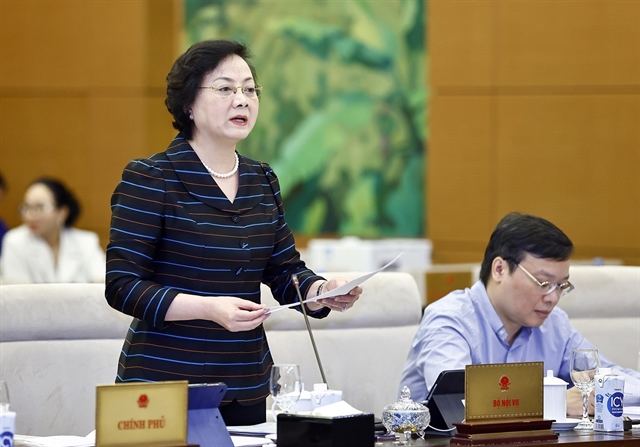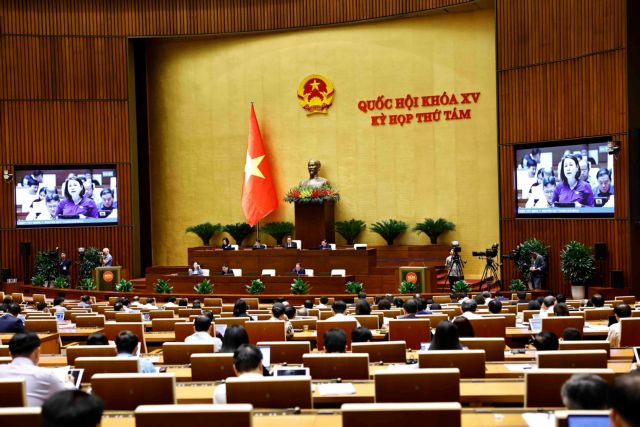 Politics & Law
Politics & Law

 |
| National Assembly deputies discuss advertising at the session. — VNA/VNS Photo Doãn Tấn |
HÀ NỘI — Continuing the eighth session, the National Assembly (NA) on Monday afternoon discussed the draft amended Law on Advertising, under the direction of Deputy Chairwoman Nguyễn Thị Thanh.
Delegate Dương Tấn Quân, from Bà Rịa-Vũng Tàu Province, said that strong sanctions were needed for businesses that repeatedly carried out violations.
Speaking at the session, he was concerned about the regulations on advertising for special products and goods. Quân expressed his hope for tighter management of such products and services such as cosmetics, food supplements, chemicals and pesticides.
Sùng A Lềnh, from the northern mountainous province of Lào Cai, asked for consideration about regulations on rights and obligations of advertising publishers.
When posting opinions and feelings about the results of using cosmetics, health protection foods and food supplements on social networks, the person must be the one who directly used the product, he said.
At the same time, Lềnh requested clarification of some contents such as how to post opinions and feelings.
Currently, there are many forms of advertisements such as video clips, broadcast on social networks or online platforms. Along with that, it is necessary to sanction people who have either not directly used the advertised product, or used it, but the actual results are not as advertised, according to Lềnh.
Contributing opinions at the session, Nguyễn Thị Thu Thuỷ, from Bình Định Province, confirmed that the amended Law on Advertising would perfect the legal framework and manage advertising activities in the context of increasing development.
She said that the amended law should differentiate specific responsibilities between the entities. The brand must be responsible for the quality of the product and the content of the information provided. The person delivering the advertising must be responsible for ensuring that it is consistent with the content provided by the company.
Thuỷ suggested adding regulations on advertising special products for children, especially milk products as a replacement for breast milk from birth, because those products are very difficult to control.
Regarding advertising in print newspapers and television, she said that the drafting committee must review relevant laws on management and handling, specific solutions to remove bad and toxic information.
Delegate Phan Thị Mỹ Dung, from Long An southern province asked for supplementing regulations on advertising on the internet.
She said that currently the law had very tight control over advertising, but on television and on the printed newspapers only. On social networks, the management was very loose due to the lack of a legal corridor. Besides, the diversity and complexity of activities on the internet environment were difficult to manage.
“If there is a lack of control, we will not achieve the goal of preventing and deterring advertising activities that violate the network environment. We will not effectively protect consumers in the e-commerce that is booming and popular today, but only resolve the consequences and damages when there are complaints, denunciations and violations discovered through inspections and checks,” she said.
Regarding the granting of construction permits for advertising works (additional clause 5, Article 31), Dung suggested that for signs and billboards with metal frames, it was necessary to take into account the safety and load-bearing capacity of the construction to which the sign or billboard is attached, as well as those which may be impacted by natural conditions, affecting the safety of neighbouring constructions and of the community during exploitation and use.
Furthermore, the construction of signs and billboards must also comply with the requirements of urban planning and landscape architecture, she said.
Trịnh Thị Tú Anh, from Lâm Đồng Central Highlands province, asked for better protection of children's rights in advertising.
She said that protecting children from advertising, especially advertising on social networks, was facing many difficulties.
Anh emphasised that online advertising was diverse and difficult to control, especially advertising displayed on unofficial websites where advertisers were always looking for new ways to attract children's attention.
Many parents were not fully aware of the harmful effects of advertising on children, leading to a lack of supervision.
Therefore, she recommended that the draft law should include a clear definition of advertising aimed at children.
It was necessary to strengthen sanctions against individuals and organisations that violate regulations, promote international cooperation with other countries to share information and experiences, together build common standards for advertising aimed at children on cross-border platforms. — VNS




